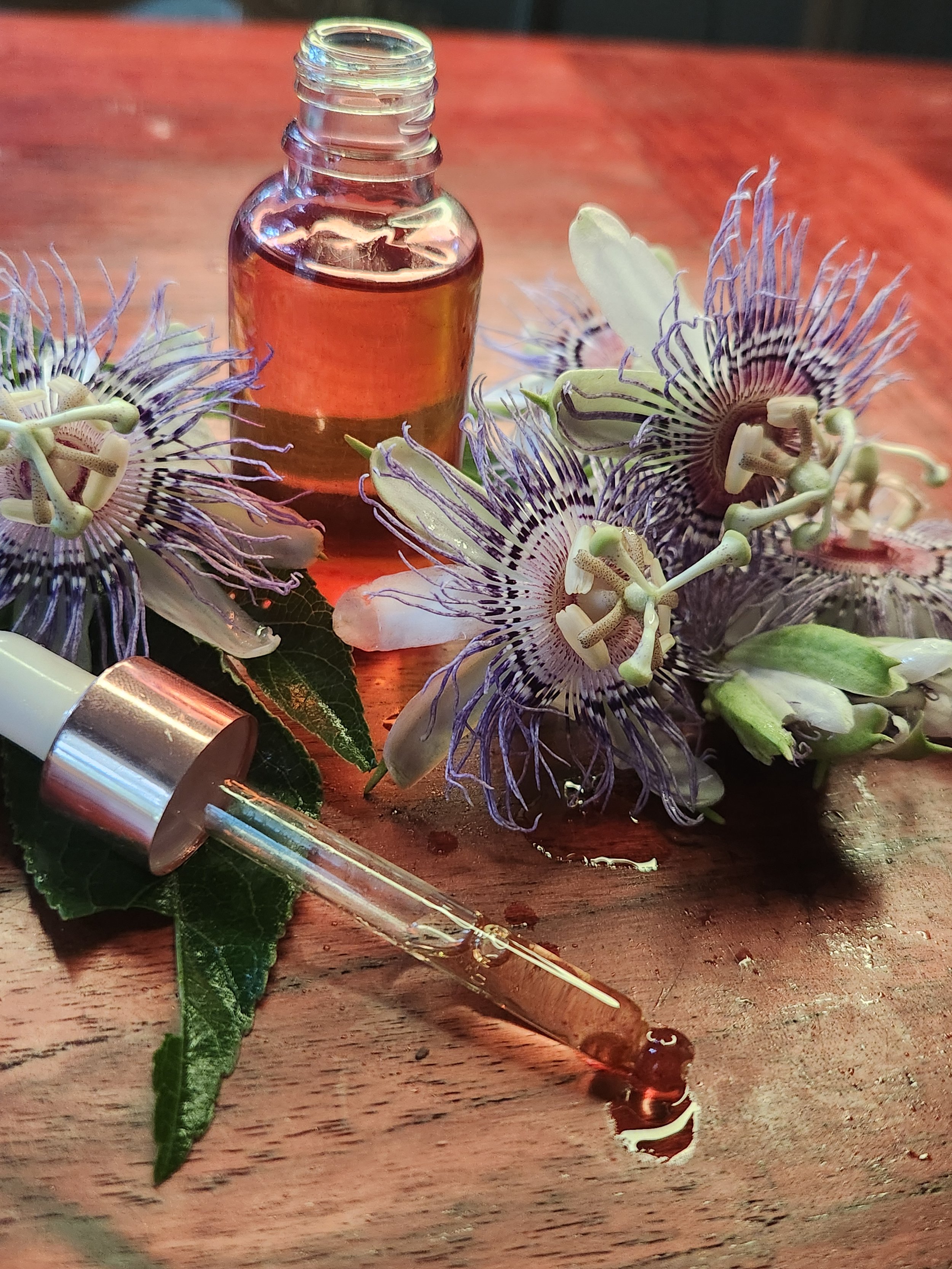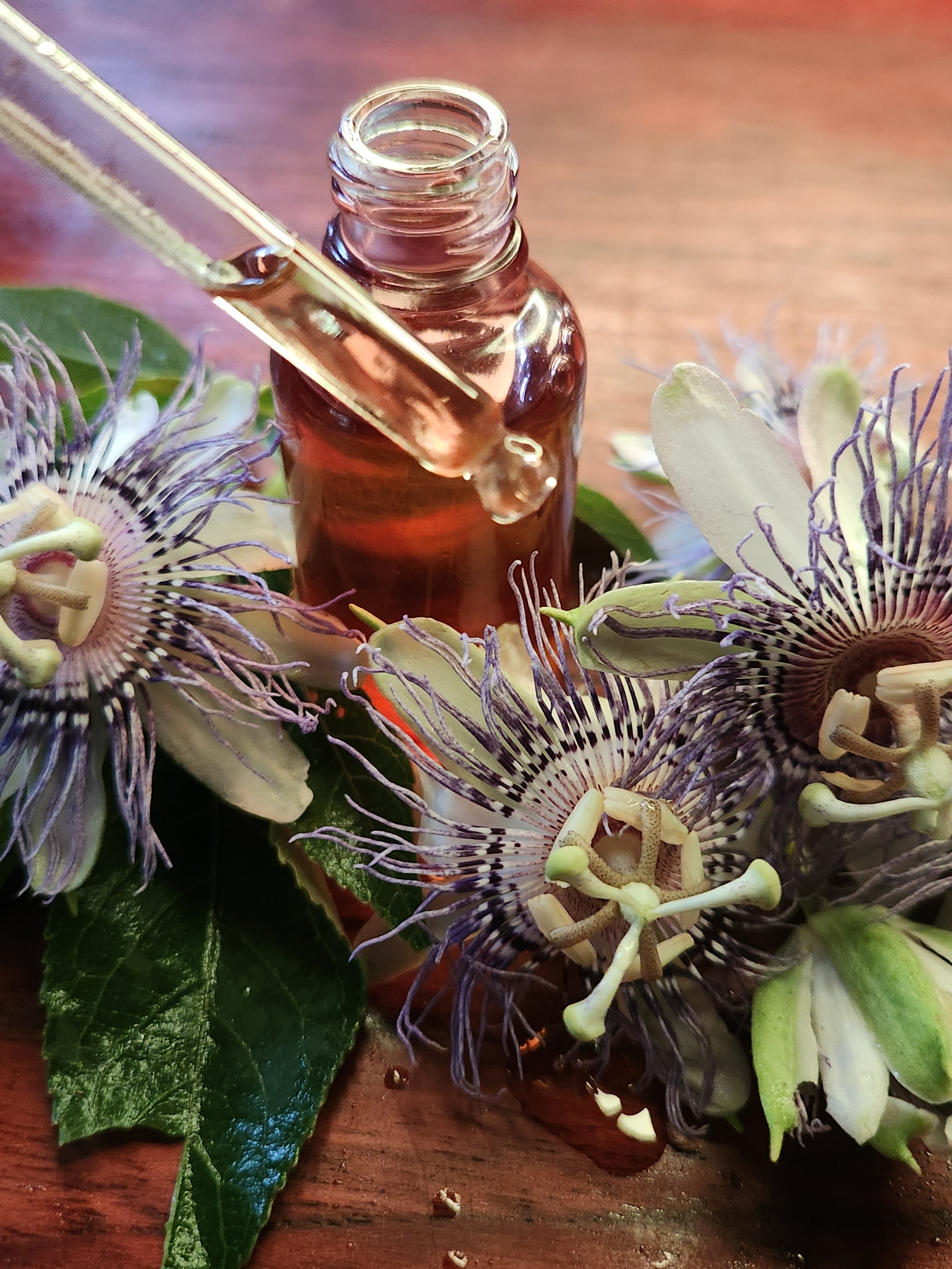Passionflower Skincare Oil
Passionflower Oil: A Powerful Skin Remedy
Infusing passionflowers, leaves, and the skin of the fruit into sunflower and avocado oils creates a nutrient-dense skincare infusion. This blend delivers a synergy of botanical compounds that nourish, hydrate, and protect the skin while addressing various skin concerns.
Key Active Ingredients & Their Skincare Benefits
1. Passionflower (Passiflora spp.) – Flowers, Leaves, & Fruit Skin
Flavonoids (Quercetin, Apigenin, Luteolin)
Potent antioxidants that neutralize free radicals, reducing premature aging and protecting against environmental damage.
Help calm redness, irritation, and inflammation, making them beneficial for sensitive or reactive skin.
Alkaloids (Harman, Harmine, Harmaline)
Have mild sedative effects, which may help reduce stress-related skin issues such as flare-ups of acne, rosacea, or eczema.
Fatty Acids (from Fruit Skin & Seeds)
Help restore the skin barrier, lock in moisture, and maintain elasticity.
Vitamin A & C
Promote collagen synthesis, brighten the complexion, and support skin regeneration.
2. Sunflower Oil (Helianthus annuus)
Linoleic Acid (Omega-6 Fatty Acid)
Strengthens the skin barrier, reducing moisture loss and supporting overall hydration.
Helps regulate sebum production, preventing clogged pores and breakouts in acne-prone skin.
Vitamin E (Tocopherol)
Powerful antioxidant that protects skin from oxidative stress, preventing fine lines and wrinkles.
Anti-Inflammatory Properties
Helps soothe redness, irritation, and sensitivity, making it excellent for eczema, rosacea, and acne-prone skin.
3. Avocado Oil (Persea gratissima)
Oleic Acid (Omega-9 Fatty Acid)
Deeply penetrates the skin, delivering long-lasting moisture and repairing dry or damaged skin.
Sterolins (Plant Steroids)
Help reduce age spots and hyperpigmentation while softening and smoothing skin texture.
Chlorophyll
Acts as a natural detoxifier that cleanses and brightens dull skin.
Carotenoids & Lecithin
Support skin elasticity and aid in cell renewal, making them beneficial for aging and scarred skin.
How These Ingredients Work Together for Skin Health
The combination of passionflower, sunflower oil, and avocado oil creates a holistic skincare blend where each component enhances the effects of the others:
1. Deep Hydration & Moisture Barrier Repair
Linoleic Acid (Sunflower) + Oleic Acid (Avocado) + Fatty Acids (Passionflower) → Strengthen the skin’s lipid barrier, preventing moisture loss and improving hydration.
Ideal for dry, dehydrated, and mature skin.
2. Anti-Aging & Skin Regeneration
Flavonoids & Vitamin C (Passionflower) + Vitamin E (Sunflower) + Carotenoids (Avocado) → Combat oxidative stress, reduce fine lines, and boost collagen production for firmer skin.
Ideal for aging, sun-damaged, and dull skin.
3. Soothing & Anti-Inflammatory Action
Alkaloids & Flavonoids (Passionflower) + Anti-Inflammatory Compounds (Sunflower) + Sterolins (Avocado) → Calm redness, irritation, and stress-related skin flare-ups.
Ideal for sensitive, eczema-prone, and acne-prone skin.
4. Brightening & Even Skin Tone
Vitamin C & Carotenoids (Passionflower & Avocado) + Chlorophyll (Avocado) → Lighten hyperpigmentation, improve radiance, and detoxify skin.
Ideal for uneven skin tone, dark spots, and tired-looking skin.
5. Acne & Oil Control
Linoleic Acid (Sunflower) + Anti-Inflammatory Flavonoids (Passionflower) + Chlorophyll (Avocado) → Balance oil production, soothe breakouts, and keep pores clear.
Ideal for acne-prone and combination skin.
This passionflower oil infusion is a deeply nourishing, protective, and healing blend for all skin types. By combining the antioxidant-rich properties of passionflower, the lightweight hydration of sunflower oil, and the deep-penetrating nourishment of avocado oil, this formulation creates a synergistic effect that moisturizes, soothes inflammation, protects against aging, and brightens skin.
Passionflower Oil: A Powerful Skin Remedy
Infusing passionflowers, leaves, and the skin of the fruit into sunflower and avocado oils creates a nutrient-dense skincare infusion. This blend delivers a synergy of botanical compounds that nourish, hydrate, and protect the skin while addressing various skin concerns.
Key Active Ingredients & Their Skincare Benefits
1. Passionflower (Passiflora spp.) – Flowers, Leaves, & Fruit Skin
Flavonoids (Quercetin, Apigenin, Luteolin)
Potent antioxidants that neutralize free radicals, reducing premature aging and protecting against environmental damage.
Help calm redness, irritation, and inflammation, making them beneficial for sensitive or reactive skin.
Alkaloids (Harman, Harmine, Harmaline)
Have mild sedative effects, which may help reduce stress-related skin issues such as flare-ups of acne, rosacea, or eczema.
Fatty Acids (from Fruit Skin & Seeds)
Help restore the skin barrier, lock in moisture, and maintain elasticity.
Vitamin A & C
Promote collagen synthesis, brighten the complexion, and support skin regeneration.
2. Sunflower Oil (Helianthus annuus)
Linoleic Acid (Omega-6 Fatty Acid)
Strengthens the skin barrier, reducing moisture loss and supporting overall hydration.
Helps regulate sebum production, preventing clogged pores and breakouts in acne-prone skin.
Vitamin E (Tocopherol)
Powerful antioxidant that protects skin from oxidative stress, preventing fine lines and wrinkles.
Anti-Inflammatory Properties
Helps soothe redness, irritation, and sensitivity, making it excellent for eczema, rosacea, and acne-prone skin.
3. Avocado Oil (Persea gratissima)
Oleic Acid (Omega-9 Fatty Acid)
Deeply penetrates the skin, delivering long-lasting moisture and repairing dry or damaged skin.
Sterolins (Plant Steroids)
Help reduce age spots and hyperpigmentation while softening and smoothing skin texture.
Chlorophyll
Acts as a natural detoxifier that cleanses and brightens dull skin.
Carotenoids & Lecithin
Support skin elasticity and aid in cell renewal, making them beneficial for aging and scarred skin.
How These Ingredients Work Together for Skin Health
The combination of passionflower, sunflower oil, and avocado oil creates a holistic skincare blend where each component enhances the effects of the others:
1. Deep Hydration & Moisture Barrier Repair
Linoleic Acid (Sunflower) + Oleic Acid (Avocado) + Fatty Acids (Passionflower) → Strengthen the skin’s lipid barrier, preventing moisture loss and improving hydration.
Ideal for dry, dehydrated, and mature skin.
2. Anti-Aging & Skin Regeneration
Flavonoids & Vitamin C (Passionflower) + Vitamin E (Sunflower) + Carotenoids (Avocado) → Combat oxidative stress, reduce fine lines, and boost collagen production for firmer skin.
Ideal for aging, sun-damaged, and dull skin.
3. Soothing & Anti-Inflammatory Action
Alkaloids & Flavonoids (Passionflower) + Anti-Inflammatory Compounds (Sunflower) + Sterolins (Avocado) → Calm redness, irritation, and stress-related skin flare-ups.
Ideal for sensitive, eczema-prone, and acne-prone skin.
4. Brightening & Even Skin Tone
Vitamin C & Carotenoids (Passionflower & Avocado) + Chlorophyll (Avocado) → Lighten hyperpigmentation, improve radiance, and detoxify skin.
Ideal for uneven skin tone, dark spots, and tired-looking skin.
5. Acne & Oil Control
Linoleic Acid (Sunflower) + Anti-Inflammatory Flavonoids (Passionflower) + Chlorophyll (Avocado) → Balance oil production, soothe breakouts, and keep pores clear.
Ideal for acne-prone and combination skin.
This passionflower oil infusion is a deeply nourishing, protective, and healing blend for all skin types. By combining the antioxidant-rich properties of passionflower, the lightweight hydration of sunflower oil, and the deep-penetrating nourishment of avocado oil, this formulation creates a synergistic effect that moisturizes, soothes inflammation, protects against aging, and brightens skin.


